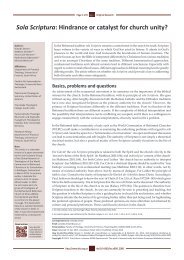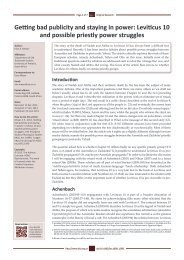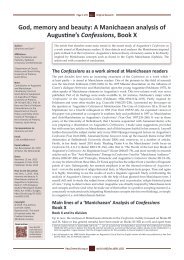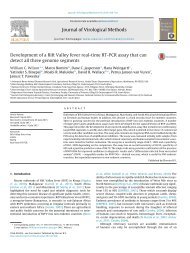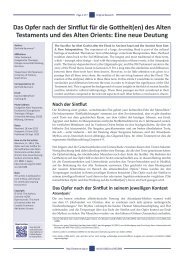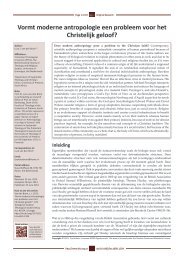Job and Ecclesiastes as (postmodern?) - HTS Teologiese Studies ...
Job and Ecclesiastes as (postmodern?) - HTS Teologiese Studies ...
Job and Ecclesiastes as (postmodern?) - HTS Teologiese Studies ...
You also want an ePaper? Increase the reach of your titles
YUMPU automatically turns print PDFs into web optimized ePapers that Google loves.
Page 3 of 8<br />
Original Research<br />
writer of <strong>Ecclesi<strong>as</strong>tes</strong>) w<strong>as</strong> a ‘wisdom writer’ in the sense that<br />
he belonged to an exclusive guild of ‘wise men’ which had<br />
preserved its corporate identity throughout the centuries<br />
since the time of the early Judean monarchy. He prefers to<br />
speak of an ‘intellectual tradition’ in Israel <strong>and</strong> argues that<br />
the placing of <strong>Ecclesi<strong>as</strong>tes</strong> within the narrow confines of a<br />
‘wisdom tradition’ may prove to be a false move which<br />
conduces to a misunderst<strong>and</strong>ing of <strong>Ecclesi<strong>as</strong>tes</strong>’s position<br />
in the history of thought. Whybray (1989:8) consequently<br />
regards Qoheleth <strong>as</strong> an independent thinker who provides a<br />
critical examination, not just of a distinct ‘wisdom tradition’,<br />
but of his own native religious tradition, enshrined in the<br />
Jewish scriptures.<br />
However, for authors like Dell (1991:143), <strong>Ecclesi<strong>as</strong>tes</strong> can<br />
be viewed <strong>as</strong> st<strong>and</strong>ing closer to the mainstream wisdom<br />
tradition than a book like <strong>Job</strong>, especially in terms of form <strong>and</strong><br />
social setting. Dell (1991:139) points to the predomination of<br />
wisdom forms in <strong>Ecclesi<strong>as</strong>tes</strong>, even though they are used in<br />
an unorthodox way. She identifies three principal smaller<br />
genres in the book which all correspond with traditional<br />
wisdom forms. The first main smaller genre identified<br />
by Dell (1991:139) is that of the wisdom saying which<br />
abounds, for example, in Chapter 7 <strong>and</strong> 9:17–10:1 (cf. also<br />
Schwienhorst-Schönberger 2004:480–483). Here the author is<br />
thought to utilise a traditional wisdom form of which he then<br />
shows the shortcomings by a remark of his own. Secondly<br />
the author employs the smaller genre of instruction in, for<br />
example, Chapter 7:13–14. According to Dell (1991:139–140)<br />
these instruction p<strong>as</strong>sages tend to follow traditional wisdom<br />
forms. The third identified smaller genre of reflection is,<br />
however, not characteristic of traditional wisdom forms but<br />
is thought to incorporate within it certain sub-genres from<br />
the wisdom tradition such <strong>as</strong> sayings or proverbs (e.g. 2:14,<br />
4:5–6), rhetorical questions (e.g. 2:2, 12, 15, 19, 22, 25) <strong>and</strong><br />
quotations (e.g. 4:5–6, 5:3). Loader (1979:130) is of the opinion<br />
that Qoheleth takes over these general wisdom forms in<br />
order to serve his own purpose namely to criticise the<br />
content of the general wisdom (cf. also Krüger 2000:32–39).<br />
The thought of <strong>Ecclesi<strong>as</strong>tes</strong> is indisputably polar (‘patterns<br />
of tension created by the counter-position of two elements<br />
to one another’) (Loader 1979:1). Thus we have talk <strong>and</strong><br />
silence, toil <strong>and</strong> joy, et cetera. These contr<strong>as</strong>ts in thought,<br />
which are scattered throughout the book, are constitutive of<br />
the structure. Thus, although <strong>Ecclesi<strong>as</strong>tes</strong> may not st<strong>and</strong> very<br />
close to the general wisdom tradition in terms of content, it<br />
certainly does display solidarity with this tradition in terms<br />
of forms <strong>and</strong> types (Loader 1979:116).<br />
This closeness to the mainstream wisdom tradition is<br />
furthermore evident from the superscription with which<br />
Chapter 1 begins. The introduction ‘words of …’ is also<br />
found in other wisdom writings such <strong>as</strong> Proverbs 22:17, 30:1<br />
<strong>and</strong> 31:1 <strong>and</strong> is, according to Dell (1991:144–145), 10 similar to<br />
introductions in Egyptian instructions such <strong>as</strong> the Instruction<br />
of Ptahhothep. 11 <strong>Ecclesi<strong>as</strong>tes</strong>’s claim to Solomonic authorship<br />
10.See also Crenshaw (1987:56) <strong>and</strong> Murphy (1988:132).<br />
11.The instruction of Ptahhotep begins: ‘The instruction of the Mayor <strong>and</strong> Vizier<br />
Ptahhotep, under the majesty of the King of Upper <strong>and</strong> Lower Egypt: Izezi, living<br />
forever <strong>and</strong> ever’ (Pritchard 1950:412).<br />
is certainly a further indication of its closeness to the general<br />
wisdom tradition (Schwienhorst-Schönberger 2004:139–142).<br />
The introduction of Qoheleth <strong>as</strong> the ‘son of David, king in<br />
Jerusalem’ (1:1) is in accordance with the tradition echoed<br />
in Proverbs <strong>and</strong> the Wisdom of Solomon to <strong>as</strong>cribe wisdom<br />
books to Solomon (Murphy 1992:1–2). It can be concluded<br />
that these markers certainly suggest a development within<br />
an undeniable wisdom context (Dell 1991:145).<br />
If one then h<strong>as</strong> to answer the question whether the books of<br />
<strong>Job</strong> <strong>and</strong> <strong>Ecclesi<strong>as</strong>tes</strong> can be regarded <strong>as</strong> wisdom literature,<br />
it can be agreed with Schmid (1966:196) who criticises a too<br />
exclusive view of wisdom (cf. also Weeks 2010:1–7). Schmid<br />
(1966:198–201) stresses the diversity of forms to be found<br />
within wisdom literature <strong>and</strong> thus argues that the notion<br />
of ‘wisdom literature’ is a very inexact <strong>and</strong> ‘open’ concept.<br />
He consequently suggests that, in order to cl<strong>as</strong>sify a piece of<br />
work <strong>as</strong> wisdom or not, the focus should not be on a specific<br />
genre but on the question whether the specific writing is<br />
characterised by wisdom thought or not. In the light of<br />
this suggestion, the books of <strong>Job</strong> <strong>and</strong> <strong>Ecclesi<strong>as</strong>tes</strong> can thus<br />
not be excluded from the wisdom corpus because a certain<br />
form does not appear in them or because they deal with an<br />
individual rather than a general problem. In this regard we<br />
agree with Clines (1989:ixi) who sees the three ‘wisdom’<br />
books of the Bible namely <strong>Job</strong>, <strong>Ecclesi<strong>as</strong>tes</strong> <strong>and</strong> Proverbs <strong>as</strong><br />
engaged in a dialogue with one another. These books are all<br />
viewed <strong>as</strong> ‘wisdom books’ because of their common concern<br />
to make sense of human behaviour <strong>and</strong> destiny <strong>and</strong> to justify<br />
the ways of God. They represent an intellectual tradition<br />
in Israel, appealing neither to divine revelation, religious<br />
interpretations of Israel’s history nor to the experience of the<br />
divine in the cult, but to everyday experience, observation<br />
<strong>and</strong> logic. They, according to Dell (2006:415), ‘appear to<br />
spring from the same mainspring of ide<strong>as</strong> <strong>as</strong> the wisdom<br />
quest, but it is true that they are very much wisdom plus selfcritique.’<br />
Wisdom in revolt?<br />
If it is accepted that the books of <strong>Job</strong> <strong>and</strong> <strong>Ecclesi<strong>as</strong>tes</strong> can be<br />
regarded <strong>as</strong> wisdom books, the question that now needs to<br />
be considered is whether the wisdom to be found in these<br />
books can be regarded <strong>as</strong> revolutionary. The question that<br />
thus needs to be <strong>as</strong>ked is: If the wisdom books of the Old<br />
Testament are believed to be in dialogue with one another,<br />
does this necessarily mean that they agree with one another?<br />
Although some scholars like Blank (1962:857–858) have<br />
argued that the books of <strong>Job</strong> <strong>and</strong> <strong>Ecclesi<strong>as</strong>tes</strong> do not differ<br />
much from traditional wisdom, many others have pointed<br />
to the revolutionary character of these books (e.g. Loader<br />
1979:130; Dell 1991:146–147; Gese 1982:161–169; Lauha<br />
1978:14–20; Saur 2012:120; Schmid 1966:196–201; Schmid<br />
2012:154–155, 190–191; Von Rad 1970:306–308; Witte<br />
2007a:432, 2007b:459). 12 For these scholars it is clear that<br />
12.According to Witte (2007b:459) ‘d<strong>as</strong> Koheletbuch … setzt sich kritisch mit der<br />
traditionellen Weisheit ausein<strong>and</strong>er, wobei es selbst auf deren sprachliche Formen<br />
zurückgreift.’ Cf. also Schmid (2012:191): ‘In its discussion with contemporary<br />
wisdom teaching <strong>as</strong> attested especially in Proverbs 1–9, Qohelet emph<strong>as</strong>izes the<br />
problems <strong>and</strong> limitations of human wisdom: it can be an aid to a happy life, but<br />
not a guarantee.’<br />
http://www.hts.org.za<br />
doi:10.4102/hts.v69i1.2002



